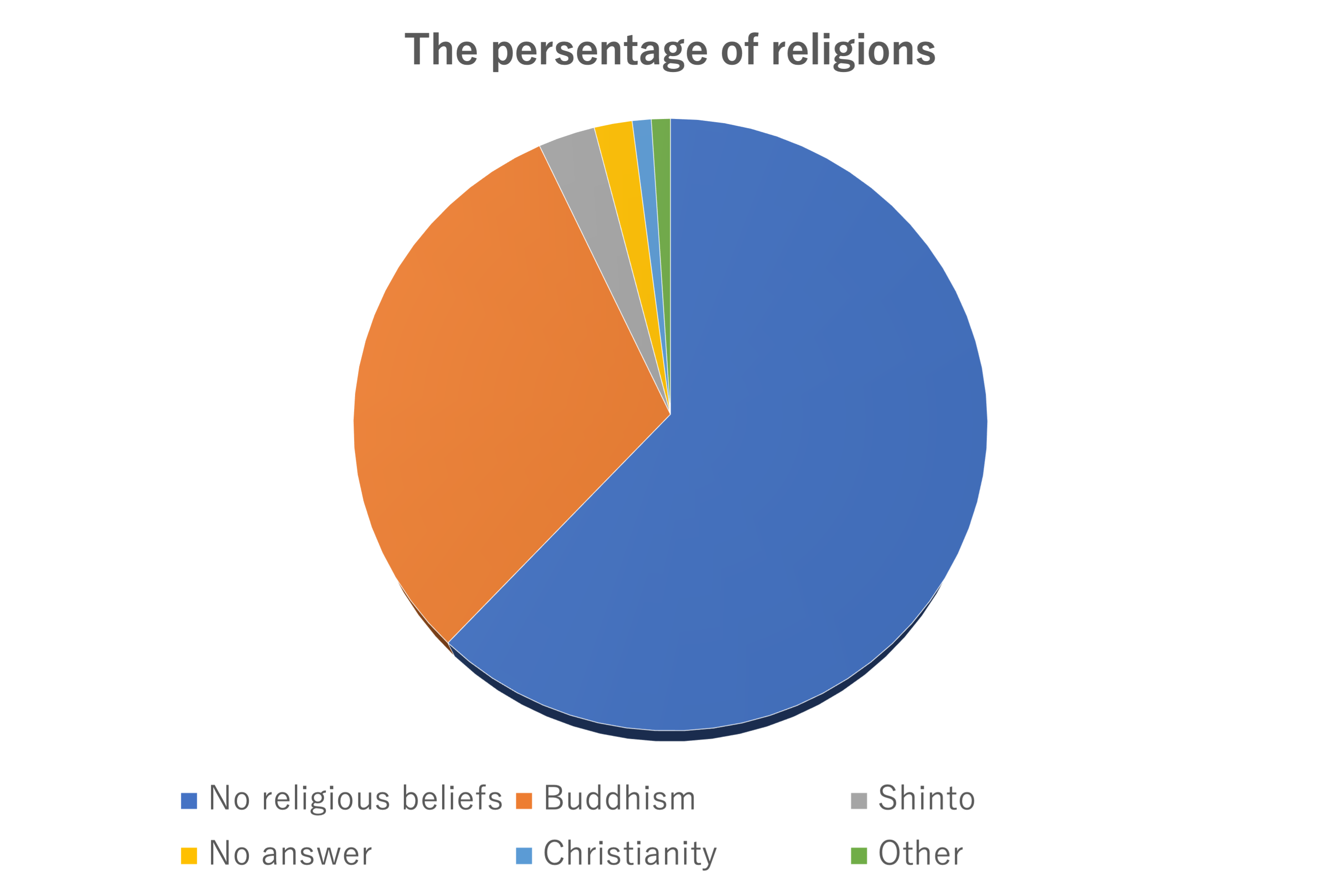Most Japanese people are said not to belong to any religion. The big blue part of the figure above is the rate of no religious beliefs in Japanese people. This research took place in 2017.
Japanese don’t believe in anything?
Non-Japanese people might think like that. But I don’t think that we don’t believe in anything.
The standard of right or wrong in our life lies in words told by older people, in Japanese fairy tales, and in cultural habits.
Although most people don’t believe in something consciously, believing in Buddhism and Shinto unconsciously.
However, this situation is unique in the world. So I tried to list the reasons.
The reasons why most Japanese people don’t believe in a certain religion
- Religious issues are causing incidents around the world, and Japan
- No political restriction that people have to believe in a certain religion
- Most people don’t know about religion and don’t give it much thought
- Influence of Western Thought & Science
- The idea of a shrine or temple as a community is rare
- It is impossible to believe in either Buddhism or Shintoism
- Buddhism and Shinto can be practiced on a daily basis.
Religious issues are causing incidents around the world, and Japan
If we talk about what I religiously believe in publicly, we get weird looks. We naturally doubt the person who believes in a religion is sick mentally or deceived by a bad cultist.
To that extent, we feel that the act of believing in some kind of religion is abnormal.
Many wars and conflicts in the world were created by religious beliefs and religious thought intertwined with politics.
In Japan, some incidents happened in the 1980s and 1990s. A new cult called “AUM-shinri-kyou” caused murders and terrorism. The main members of the cult were executed by the death penalty. The impression of the incident is tremendous.
In the case of Prime Minister Abe’s murder, the mother of the murderer was a devout believer in a new religion and paid a lot of money to the religious organization, which made his life difficult and created a reason for the crime. There was a political connection between the religious group and Prime Minister Abe.
Several emerging religious groups are stable in Japan. There might be a high degree of cohesion within the group and a good part of the community, but they request to pay much money to solve the cause of any unhappiness.
In addition, the members of such groups are mentally dependent on the religious group, and believers can’t look at problems rationally, which often causes problems in the family. In most cases, when we hear of people who do not believe in the religion but have relatives or parents who are believers, they are in trouble.
Japanese people who have believed in Buddhism for a while do not understand the fact that believing in something so much is causing problems.
Although Buddhism has the image of worshipping Buddhist statues, its fundamental teaching is that you believe in yourself and that you are the one to rely on.
In history, Christianity induced many massacres because people who don’t believe in Christianity are not human. Islam is also at odds with and terrorizing another religion.
Since religion and politics are often intertwined, one can assume that religion has been used politically.
This is my personal opinion, but I believe that belief in one God is something like World War II, in which Japan fought for this country with the emperor.
That’s why most Japanese have an aversion to religion.
No political restriction that people have to believe in a certain religion
I did not know that there are countries where the religion you believe in is listed on your ID card. It is as if they are being told that they cannot live without belonging to a religion.
Hinduism is commonly believed in India, but it seems that some politicians wanted to instill Buddhism to eliminate the status discrimination in India that Hinduism has historically held.
The problems created by the integration of religion and society appear to be significant.
The state does not discriminate based on religion, and I think it is unreasonable for it to do so. It is less important what a person believes than whether he is good or bad in himself, to others, to his community, or to his country. Harassing others because they don’t believe the same things you do is what wicked people do.
Being born and raised in Japan, we don’t know much about religion, but we don’t have to worry about it because religion doesn’t change anything in our lives. What religion do you believe in in Japanese society? I have never been asked by Japanese people. Believe it or not, we go to temples, shrines, and churches. We also go to other religious institutions for observation.
Japanese Buddhism also had political ties, but there have been few cases of political intervention by monks.
The Emperor, the representative priest of Shintoism, and former military commanders(Busho/武将) conducted politics. Rather, I believe that religion has intervened more in current Japanese politics to the extent that there are political parties carrying the signs of emerging religions.
Most people don’t know about religion and don’t give it much thought
We don’t have a chance unless we don’t have a connection to other countries people.
We learned cultural habits automatically from grandmothers, grandfathers, and parents. So we know Buddhist customs, visiting shrines, that there are gods in various places, and that if you do something wrong, you have to pay for it someday.
But as already mentioned above, Japanese people have an aversion to believing in any kind of religion, and even if they did not have an aversion, they do not think about religion unless something difficult happens in their daily lives.
That is why new religions seem to be gaining prominence and power.
I think people look for something to rely on when they are in hard times. Just as people read books to learn or consult others at that time, people who turn to religion tend to start believing in religion.
So if you have not thought about religion, it might mean that they have never faced a major difficulty in a certain way, or that they have been able to solve it by themselves or with the help of others.
Influence of Science and modernizing society
I think that the relatively affluent society has made it possible to lead a somewhat happy life without praying to the gods.
In addition, it is highly likely that science has become the place to turn to in times of trouble, as more and more problems can be proven by psychological research and scientific experiments without resorting to religion.
Some people, partly because they are unfamiliar with religion itself, believe that it contains unscientific ideas or is a mixture of precepts that were created at some stage in history and are inconsistent with modern life.
In fact, there are great teachings preached in Buddhism that are applicable to the modern world, but I am sure that science has increased the number of people who do not believe in what they cannot see.
This is partly because many people are migrating to urban areas.
The countryside is said to be a village society, and relationships with neighbors were more closely. We belonged to a nearby temple as a parishioner, and we also interacted with each other and held festivals at nearby shrines to get together.
However, in urban areas, there are no opportunities to get together with such people, and we do not become danka (parishioners) and only participate in large festivals. For these reasons, opportunities to get involved with temples and shrines decrease.
Denying religion in order to believe in science is also something to consider, but the fact is that one may deny what has been scientifically proven in order to believe in religion.
I think it is problematic to deny reality in an attempt to deny the contradictions of religion.
It is unfortunate that there are scientists who deny experimental results because they are Christian, in addition to the celestial and geocentric theories.
The idea of a shrine or temple as a community is rare
I don’t know about the world as a whole, but people who attend churches and mosques form communities with other people who attend, and relationships are formed that have nothing to do with their daily work.
There is almost no such community in Japanese temples and shrines. I hear that new religions have such communities.
For the Japanese, community used to be the relationships in the village, and over the past few decades as people have migrated to the cities, there is no longer anything that plays a community role.
If I were in need of help or worried about something now, the people I could turn to would be friends I made at work or school or people I met on the Internet whom I have never met.
Sometimes communities create unnecessary ties, but I would be happier with social connections.
Some people still go to the temple for advice. Some monks offer advice and help. However, many temples have lost their connection with people.
It is impossible to believe in either Buddhism or Shintoism
When asked what they believe in as a religion, Japanese people usually come up with Shintoism and Buddhism. Those who believe in other religions will undoubtedly mention some religions they believe in.
Shinto is an important faith in Japan, but it does not strictly fit the definition of religion, as it has no scriptures and no founder.
It is believed somewhat by the Japanese, and rituals exist, but it has nothing to tell humans what they are supposed to do. Some of the words of the rituals are only known to be old Japanese, or we do not even know what they mean anymore.
Shinto has existed in Japan since who knows when. Buddhism was introduced there about 1500 years ago, and shrines and temples were treated as one. I think that Shintoism, which holds that there are many gods, and Buddhism, which holds that there are many kinds of Buddhas, were similar in some respects.
Although Buddhism and Shinto were not clearly distinguished, they were never completely absorbed into one or the other.
The concept of a mixture of Shinto and Buddhism has no name. If you go to a shrine or a temple and are asked what religion you believe in, you are believing in something that has no name.
Japanese people do not believe only in Shintoism, nor do they believe only in Buddhism. I think this aspect is one of the reasons why Japanese people do not stick to any particular religion.
The Shinto concept of evil is not found in Buddhism. There are purification ceremonies at shrines to ward off evil spirits. Otherwise, the wisdom of life that Buddhism teaches is still a helpful concept today. In recent years, researchers in quantum mechanics have become interested in the connection between Buddhist teachings and science.
Buddhism and Shinto can be practiced on a daily basis
Buddhist and Shinto teachings do not necessarily require praying to the gods.
In temples and shrines, of course, people pray to gods and Buddhist deities, but for ordinary people who are not priests, praying to gods is not what they should do.
What ordinary people should do is face their lives and live based on Shinto and Buddhist concepts.
The precepts that Buddhism conveys are also all things that Japanese people can no longer take for granted.
Some sects have distorted interpretations due to ideas that arose during history. But basically, it is a teaching to correct one’s actions, words, and thoughts, and to avoid doing wrong and to do good.
Shinto does not teach a specific course of action, but it does stress the importance of avoiding bad things and being pure. It also implies that our thoughts have some influence on reality.
This does not require that we pray at shrines or temples. They are things that we must practice in our daily lives to live our lives happily.
I’ll write more about Buddhism and Shinto teachings in another article.
Summary
I hope you now understand that for various reasons, Japanese people are not interested in religion and cannot say what they believe in.
Is it just me, or does it seem contradictory that religion causes conflict among people?
It is often said that Japan is tolerant of other countries’ religions, but in a way, I think people understand that they cannot control what others believe. Frankly, many people are afraid that they will be proselytized by those who believe in another religion, or that they will be attacked or terrorized. We are wary of our country or our own lives being threatened by some other religion.
If they live happily by believing in their religion and do not try to violate the rights of others, I don’t think there is any need for others to deny them anything.





Comments